
Latest News
- Hyundai E&C Accelerates Global Nuclear Expansion into the U.S. Nuclear Market
- Hyundai E&C Shifts into High Gear to Enter Nordic Large-Scale Nuclear Market
- Hyundai E&C Strengthens Korea-Japan Cooperation in Energy Transition and New Growth Businesses
- Hyundai E&C Signals Green Light for Large-Scale Nuclear Power Plant Business in Europe
- Hyundai E&C Unveils Energy-driven Growth Strategy “H-Road”
21st Century El Dorado: Hyundai E&C’s Foray into Latin America and Caribbean Market
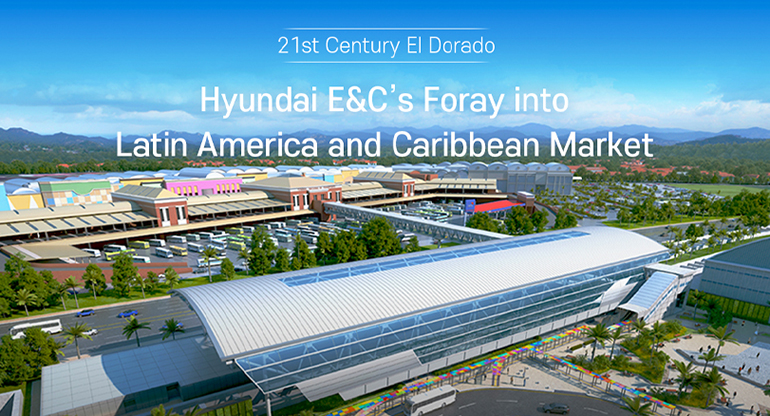
■Hyundai E&C Technology Builds New Gateway to Machu Picchu
<Adventure By Accident> is an entertainment program that offers a somewhat subdued glimpse into Cusco in Peru. This is partly due to the show's unique way of traveling, but also due to the lack of convenient infrastructure making travel and accommodation a hassle. Hyundai E&C recently completed the groundwork for a new international airport in the city of Chinchero, 15 km northwest of Cusco, and has begun full-scale construction of its terminal. The international airport, which will be built in the highlands at an altitude of 3,720 m above sea level, will provide direct access to Machu Picchu, a World Heritage Site, without the need for international and domestic flight transfers.
Situated halfway around the globe, Latin America and the Caribbean remains a largely unexplored continent with numerous locations unfamiliar to many. The region encompasses Central America (including Mexico), the Caribbean, and South America (excluding the U.S. and Canada), lying between 32 degrees north and 54 degrees south latitude,. Spanning an area of roughly 20.55㎢, this region comprises 33 sovereign nations and some British and French colonial territories. However, it's been garnering significant global attention recently. With the shifting dynamics of the global value chain centered around the United States, the potential of Latin America and the Caribbean’s resource-abundant markets with great potential are undergoing a reevaluation.
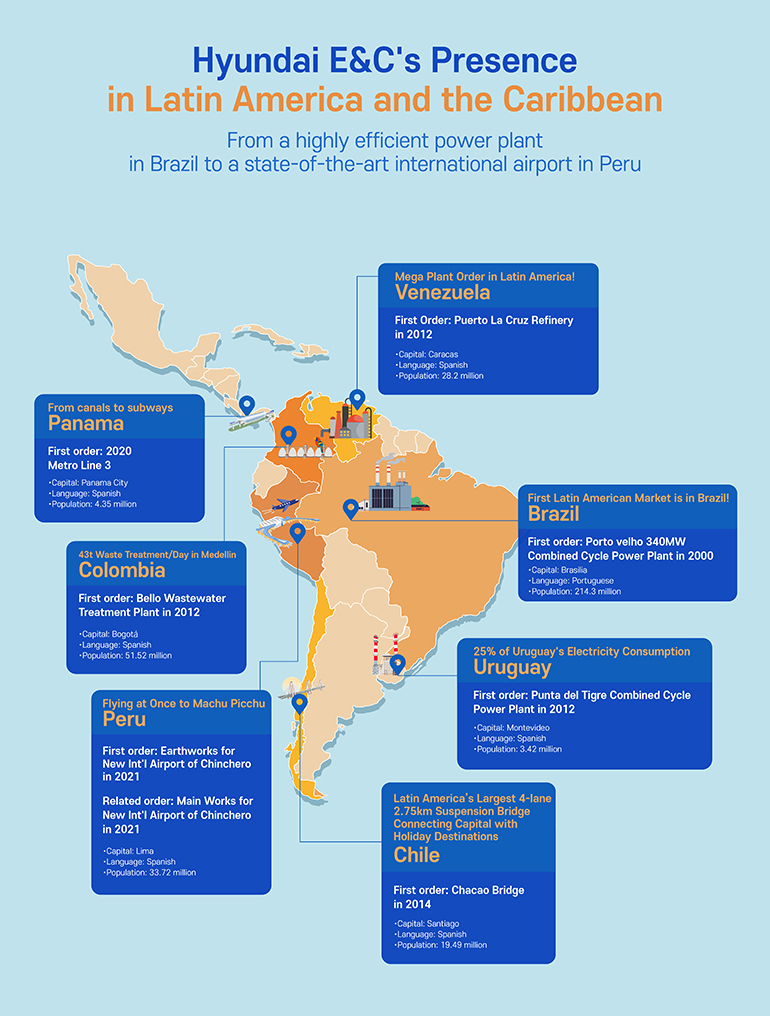
Hyundai E&C first entered Latin America and the Caribbean region in 2000. The “Porto velho 340MW Combined Cycle Power Plant” in Brazil was the first project. Since it was an uncharted territory, there were many difficulties in entering the new market. Although it is a huge market with a population of over 500 million people and abundant resources, the risk was also high due to pollical and economic uncertainties.
Hyundai E&C's presence in Latin America, after being somewhat stalled, resumed in 2012, after the company became part of Hyundai Motor Group. This was also the year that Hyundai Motor Group's recognition and status in Latin America increased, as the Hyundai Motor Brazil plant was completed and local strategic models were produced. Hyundai E&C was also able to take advantage of this trend to diversify its overseas construction market, which had been focused on the Middle East and Southeast Asia, and to enter the Latin American and Caribbean markets more aggressively. Since then, Hyundai E&C has made various efforts such as establishing branches to promote localization and strengthening public-private partnerships to target underdeveloped infrastructure, and has won projects worth nearly $10 billion in seven countries in the Latin American and the Caribbean markets, demonstrating the power of K-Construction even on the other side of the world.
■Power Projects Pave the Way for Latin American and Caribbean Markets
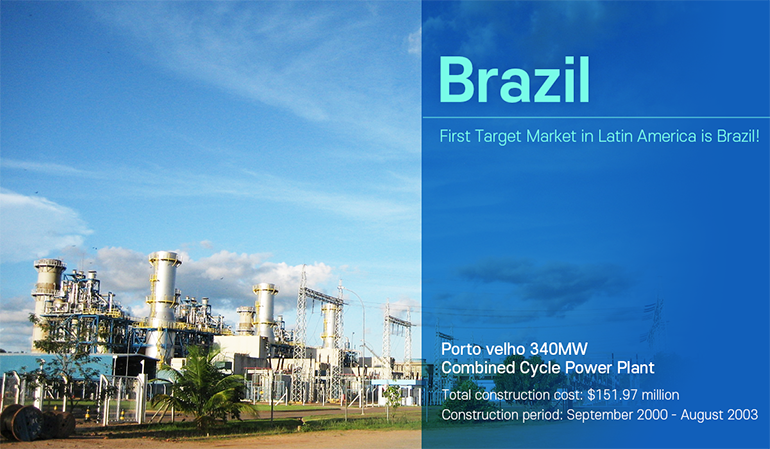
Reliant electricity supply is a priority for emerging countries that lack infrastructure. With a track record of large-scale power and plant construction in the Middle East, it's no surprise that Hyundai E&C's first project in Latin America was a combined cycle power plant in Brazil, a country that was growing rapidly at the time.
The Porto velho 340MW Combined Cycle Power Plant in Brazil, which broke ground in September 2000, was a highly efficient power plant that utilized waste heat from gas turbines, unlike typical thermal power plants. Hyundai E&C completed the project, which included three gas turbines and three boilers, as well as a steam turbine and auxiliary equipment, in 35 months, marking its first entry into Latin America.
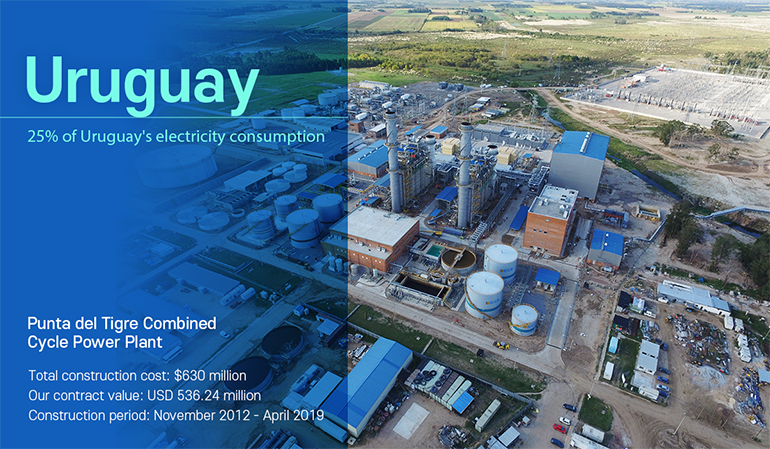
Since then, Hyundai E&C has successfully constructed the country's largest power plant, which is responsible for 25% of Uruguay's electricity consumption. The Punta del Tigre Combined Cycle Power Plant, which broke ground in November 2012, is a large-scale power generation project in the Punta del Tigre region, 40 km west of Uruguay's capital, Montevideo, and was built by Hyundai E&C in a consortium with Hyundai Corporation and KEPCO KPS. The successful completion of the plant helped Uruguay resolve a severe power shortage.
■Green Freshwater Project Targeting Massive Environmental Market
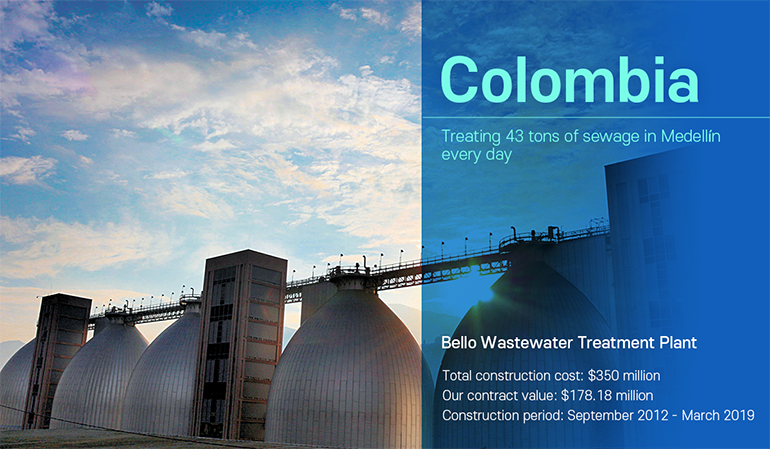
Hyundai E&C's second time expansion into Latin America is Colombia, an agricultural country known as the “Land of Coffee”. Hyundai E&C established its Bogota office in 2010 to explore the market, and two years later won the $350 million Bello Wastewater Treatment Plant. Despite the country's abundant water resources, water availability was poor and water quality management capacity was severely insufficient, leading the Public Works Department of Medellín, Colombia's second largest city, to call for a project to treat sewage from the Aburra canyon and clean up the Medellín River.
In addition to Hyundai E&C, Spain's Acciona Agua and Hyundai Engineering were involved in a project to build a sewage treatment plant with a capacity of 430,000 tons per day in the city of Bello, 25 km from Medellín. As a project with a water treatment specialist, the Bello Wastewater Treatment Plant was built as an ecological facility incorporating the latest technologies. The environment-friendly sewage treatment system using the Conventional Activated Sludge method and the energy recycling system that converts biogas generated from the sewage treatment process into electrical energy were cited as best practices of sustainable construction. The project also contributed to local development by installing a park and observatory for local residents on a vast land area of 429,752㎡ (4.5 times the size of Yeouido).
*Conventional Activated Sludge: Floc aggregates made from various organic and inorganic materials in sewage and wastewater mixed with microorganisms, which are utilized to break down organic matter and precipitate and remove multiplying microorganisms.
■ Oil Plant with Proven Global Track Record

Surprisingly, the country with the largest oil reserves in the world is Venezuela, located in northern South America. The oil reserves are also the reason why Hyundai E&C opened a branch in the Venezuelan capital of Caracas in 2012, following the opening of a branch in Bogotá, Colombia.
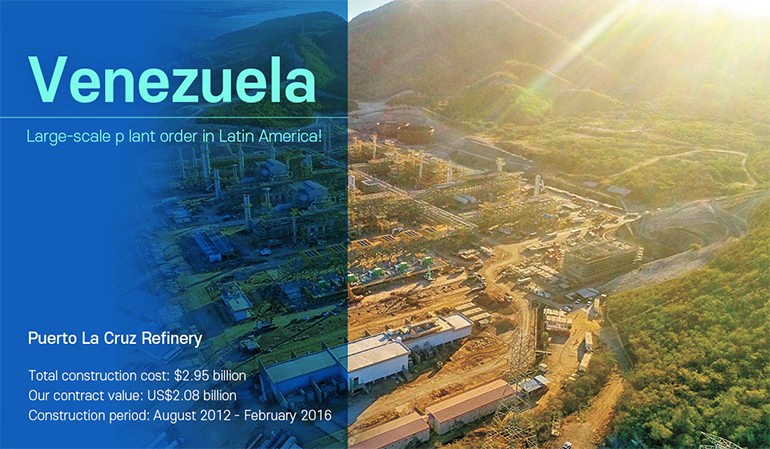
The project for Puerto La Cruz Refinery in Venezuela, which Hyundai E&C won in June 2012, involves improving facilities and equipment at the refinery, located 250 km east of Caracas, with a total construction cost of $3 billion. The project, which modernizes an existing refinery to produce high-value petroleum products, was significant in that it expanded the market for petrochemical plants in Latin America, which had been skewed toward the Middle East.
■ Three Transportation Infrastructure Projects: Rail, Road (Bridge), and Airport
Latin America is home to breathtaking attractions such as Machu Picchu, a cultural site located over 3,000 m above sea level, Iguazu Falls, one of the world's three largest waterfalls, and the vast region of Salar de Uyuni. With such diverse terrain comes the need for diverse transportation strategies. However, many Latin American countries rely on aging roads, which hinder movement and interaction.
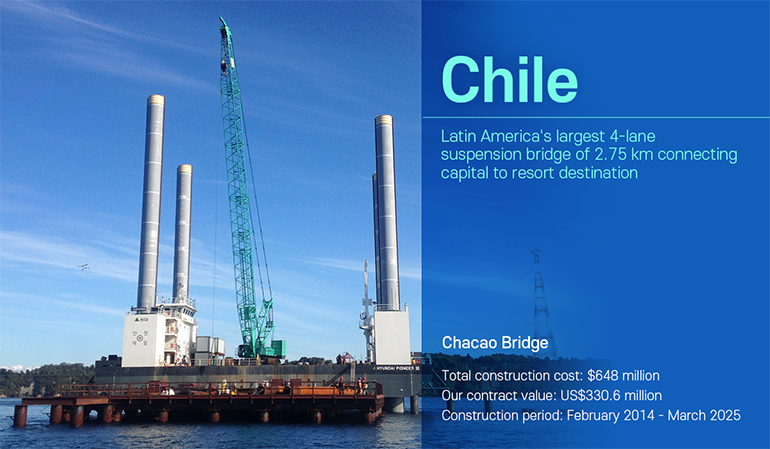
Hyundai E&C took on the challenge to build South America's first four-lane suspension bridge in February 2014 when it won the $648 million “Chacao Bridge” project in Chile. The bridge, which will connect the popular resort island of Chiloé to the Chilean mainland, is a national project that will cross the Chacao Channel in the Los Lagos region, located 1,000 km south of the capital city of Santiago. The project is expected to be another showcase of Hyundai E&C's bridge construction capabilities, which have been recognized globally with projects such as the Sheikh Jaber Al-Ahmad Al-Sabah Causeway Bridge in Kuwait and the Yavuz Sultan Selim Bridge known as the Third Bosphorus Bridge in Turkey.

If Chile expanded its road network with a land bridge, Panama, a country known for its canals, will lay a faster and more convenient rail line to ease its extreme traffic congestion. Hyundai E&C was awarded the $2.81 billion “Panama Metro Line No. 3” project by Metro de Panama S.A. in 2020, and is building a 25-km-long monorail connecting Panama City to the Arraiján district. Hyundai E&C won the largest infrastructure project in Panama's history by outbidding the world's leading competitors and scoring first in all technical, commercial, and financial categories. Considering the area is an ultra-high seismic zone, Hyundai E&C applied an anti-seismic design that can withstand an earthquake with a magnitude of 9.0 or higher, and drilled with 14-m-diameter shielded Tunnel Boring Machine (TBM) to minimize noise and vibration in the seabed of the canal, demonstrating K-construction's technological prowess.
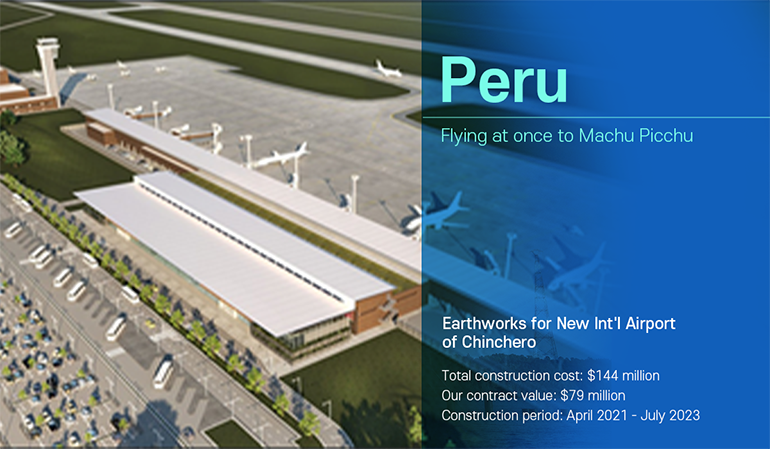
In Peru, South America, we are also building a “skyway”. Peru's Machu Picchu, a World Heritage Site and Inca site, is the crown jewel of any trip to South America, but the aging facilities at nearby Alejandro Velasco Astete International Airport require a layover in the capital city of Lima.
In March 2021, Hyundai E&C was awarded a project for “Earthworks for New Int'l Airport of Chinchero in Peru”, which will become the new gateway to Machu Picchu, and four months later, in July, Hyundai E&C won back-to-back orders for the new runway and terminal at Chinchero International Airport, which will have a capacity to handle 5.7 million passengers per year with a total of 4 km of runway and 13 gates at an altitude of 3,720 m above sea level.
Hyundai E&C formed Team Korea with the Ministry of Land, Infrastructure and Transport and Korea Airports Corporation to win the historic project, which will build a state-of-the-art and eco-friendly airport that will showcase the power of K-Construction. Hyundai E&C will apply BIM (Building Information Modelling) to digitize and manage the entire process of design, construction, and maintenance, maximizing design distinction and energy efficiency.
■ Dreaming of a 21st Century El Dorado
Hyundai E&C's presence in the Latin American and the Caribbean markets is ongoing. With our rich construction experience and leading technology, we are winning large-scale national projects that have become the battleground for global construction companies, and we are making people's lives more convenient and prosperous through the construction of infrastructure.
New technologies are in full development to meet the changing needs of countries in Latin America and the Caribbean. We are maintaining our leadership in the region by increasing the importance of green projects to keep pace with global climate change policies, and enhancing our capabilities in response to the growing interest in smart cities with cutting-edge digital systems.
In the 16th century, Spaniards believed that the land of gold, El Dorado, lay on the banks of the Amazon River. Hyundai E&C is building a 21st century El Dorado with our proprietary technology, by constructing cutting-edge, advanced infrastructure on the other side of the world.

